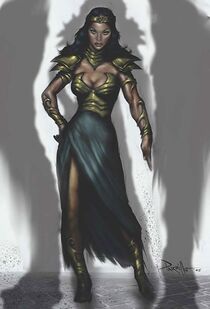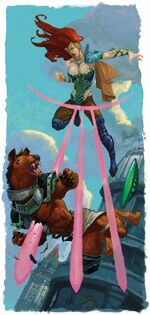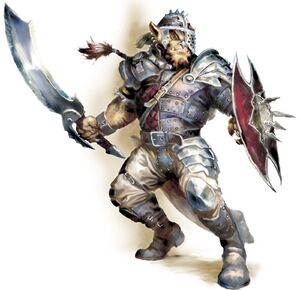Armor (D&D equipment)
 | |
| Unofficial rules compendium | |
|
|
- This helmet, I suppose,
- Was meant to ward off blows,
- It's very hot
- And weighs a lot,
- As many a guardsman knows.
- -- Gilbert & Sullivan, Princess Ida
Armor Table
Armor |
Cost |
Armor/Shield Bonus |
Maximum Dex Bonus |
Armor Check Penalty |
Arcane Spell Failure Chance |
Speed |
Weight |
| Light Armor | |||||||
| Bracers | 200 gp | +3 | +4 | 0 | 15% | 20 ft. | 20 lb. |
| Medium Armor | |||||||
| Laminated Breastplate | 100 gp | +4 | +3 | -4 | 30% | 20 ft. | 25 lb. |
| Bronze Breastplate | 200 gp | +4 | +4 | -4 | 25% | 20 ft. | 30 lb. |
| Piecemeal Armor | 400 gp | +4 | +3 | -3 | 20% | 20 ft. | 30 lb. |
Rules
Partial Armor
Partial armor is a template that can be added to any type of worn armor or to any shield except a tower shield.
Partial looks like regular armor, only sections of it has been cut away, leaving the user open to blindside attacks. In order for partial armor to be protective, the wearer has to position himself so that only armored parts are exposed to the enemy. It works well in formation and when aware of the enemy, but is less useful if the fight degenerates to a general melee. A feinted or flat-footed wearer cannot effectively present it to the enemy. City guardsmen, sentries, engineers, and other warriors who are easily surprised or supposed to do other work while in dangerous situations avoid partial armor.
Some partial armor is ceremonial, designed to look exciting and show off the wearer's body to best advantage, and is worn almost as much for show as to fight in. Such armor is often used by gladiators, show-off barbarians, and decadent warriors. More mundane versions of partial armor simply removes the back side of the armor; this is supposed to discourage soldiers from fleeing.
Rules: Partial armor 75% as much as regular armor of the same type, and requires the same armor proficiency feat to use. It weights only half as much, the maximum dexterity bonus increases by one, the armor check penalty decreases by two (to a minimum of 0), and it impacts speed and movement as if it was one category less; medium partial armor is as hindering as normal light armor, heavy partial armor is as hindering as medium armor. This applies to both movement and to the use of feats and abilities restricted by armor type. Partial armor only provides its armor bonus when the wearer is able to use his dexterity bonus to armor class. On the stat block, simply do not include the armor or shield bonus of partial armor in flat-footed armor class.
Regular armor can be redesigned as partial armor at 20% of the original cost and partial armor can be redesigned as regular armor at 50% of regular cost. It is possible to design a set of armor that can be work as either partial or full armor by adding additional pieces; such a kit cost 150% of the normal cost. Do not include the price of any magic enchantments in the redesign cost, but do include the cost of masterwork quality and special materials.

|

|

|
Some examples of partial armor.
Donning Armor
The times noted for donning armor in the PH are excessive; minutes should be rounds.
Armor and Hardness (Optional Rule)
Characters gain Hardness from wearing armor. Light armor confers a Hardness of 1; heavy armor confers a Hardness of 2.
Admantine armor confers more Hardness; 1 point for light admantine armor, 2 points for medium, and three points for light. In this case, the Hardness conferred stacks, so light admantine armor has Hardness 1, medium Hardness 3 and heavy Hardness 5.
Hardness reduces the damage from each incoming attack. The only way to bypass hardness is to do entirely non-physical damage (such as from mind-affecting powers) or to cause wounds.
Classes that give undefeatable DR (like the Barbarian or Knight instead gain Hardness of this kind, and the bonuses stack.
Armor Descriptions
Bracers
Usually consisting of bracers and greaves, combined with some choice buckles worn on the body. Generally worn with a skullcap. Like piecemeal armor, this can be salvaged from battlefields.
Bronze Breastplate
A breastplate made of bronze, a metal that can be cast and modified with high precision to adapt the armor to the wearer. The statistics of the bronze breastplate are from the DMG p 144, spelled out here for convenience.
Laminated Breastplate
A breastplate made out of laminated linnen, wood, or leather boiled in oil for strength. Some are made of giant insect chitin. Lighter but more bulky than a metal breastplate. As organic armor it can be worn by druids, though many druids consider the highly crafted substance sinful. The greaves and vambraces can be of organic materials too, but are often replaced with metal.
Piecemeal Armor
Piecemeal armor is a collection of a few rather heavy armor pieces worn without padding and under-suits included in normal armor. Built around a choice torso armor, most often a breastplate, with lose bracers or even the shields of smaller creatures used as protection for the limbs. Includes a helmet. Monsters, barbarians, and warriors on long campaigns often wear such, taken as spoils from numerous battlefields. It is also possible to pick choice armor pieces from an armorer's shop or even to custom-make them, this is expensive and unpopular but the only way to make masterwork piecemeal armor.
| Seal of Approval | |

|
This page is approved by
|